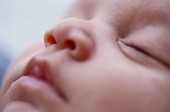- Could Your Grocery Store Meat Be Causing Recurring UTIs?
- Are You Making This Expensive Thermostat Error This Winter?
- Recognizing the Signs of Hypothyroidism
- 10 Strategies to Overcome Insomnia
- Could Artificial Sweeteners Be Aging the Brain Faster?
- Techniques for Soothing Your Nervous System
- Does the Water in Your House Smell Funny? Here’s Why
- Can a Daily Dose of Apple Cider Vinegar Actually Aid Weight Loss?
- 6 Health Beverages That Can Actually Spike Your Blood Sugar
- Treatment Options for Social Anxiety Disorder
Putting Baby to Sleep on Animal Fur May Lower Asthma Risk: Study


Infants who sleep on animal fur may be less likely to develop asthma later in childhood, new research suggests.
The study included more than 2,400 healthy city-dwelling newborns in Germany who were followed until age 10. Of those children, 55 percent slept on animal skin in their first three months of life.
Compared to other youngsters, those who slept on animal skin in infancy were 79 percent less likely to have asthma at age 6, and 41 percent less likely to have asthma by age 10, the investigators found.
The study was presented Sunday at the European Respiratory Society meeting in Munich. The data and conclusions of research presented at medical meetings should be viewed as preliminary until published in a peer-reviewed journal.
“Previous studies have suggested that microbes found in rural settings can protect from asthma. An animal skin might also be a reservoir for various kinds of microbes, following similar mechanisms as has been observed in rural environments,” Christina Tischer, from the Helmholtz Zentrum Munchen Research Center in Germany, said in a European Lung Foundation news release.
“Our findings have confirmed that it is crucial to study further the actual microbial environment within the animal fur to confirm these associations,” she added.
While the study found an association between exposure to animal skins and fur during infancy and decreased risk of developing asthma, it did not prove a cause-and-effect relationship.
More information
The U.S. National Library of Medicine has more about asthma.
Source: HealthDay
Copyright © 2026 HealthDay. All rights reserved.










